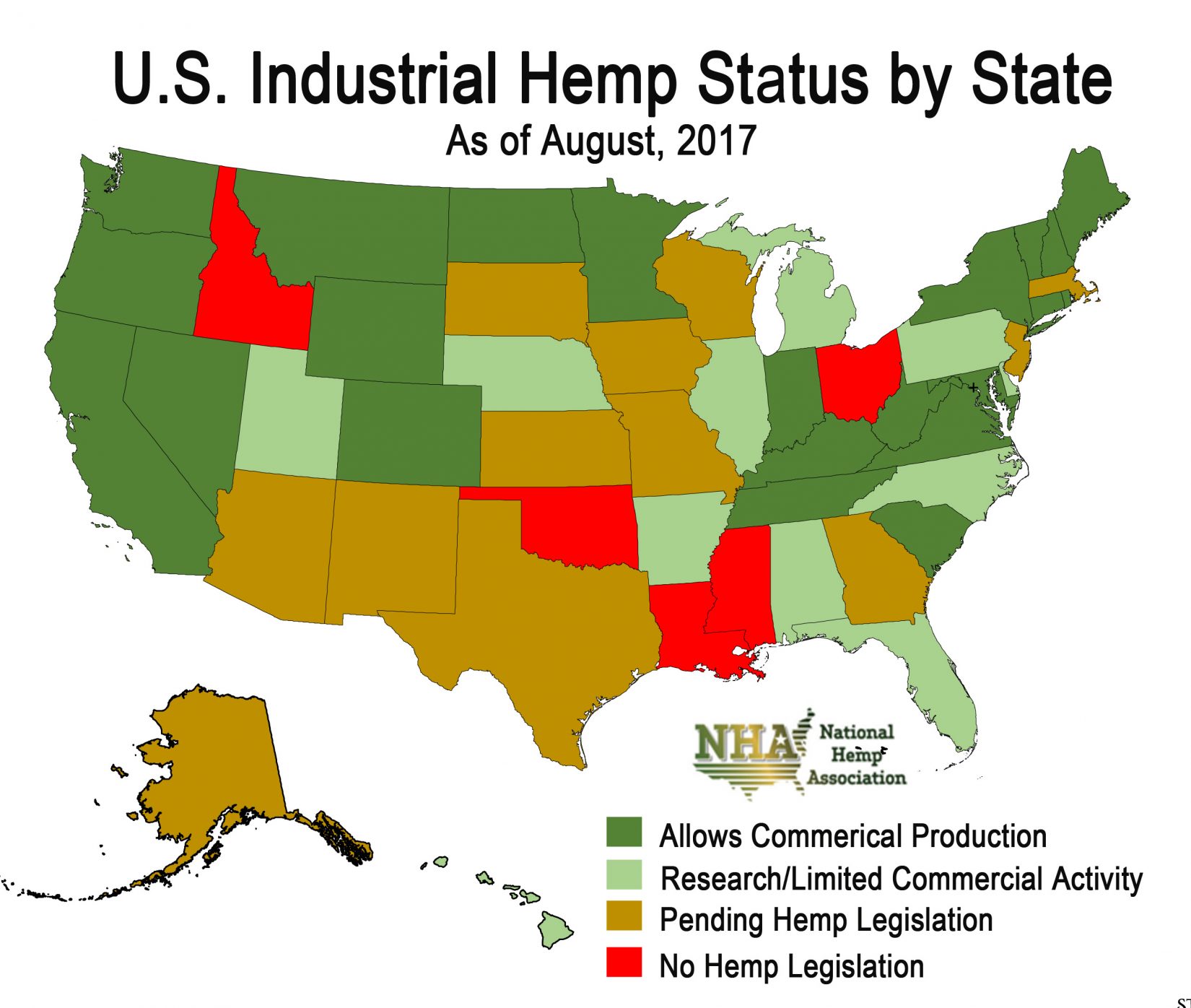These are times of cautious but rising optimism for supporters of industrial hemp.
Since 1970, all forms of Cannabis sativa L., including hemp, have been classified as a Schedule I drug under the Controlled Substances Act. Past legislative attempts to remove hemp from the CSA — six bills in the House and three in the Senate since 2005 — all died in committees without a floor vote.
But the Industrial Hemp Farming Act is back for its seventh iteration in the House, this time with momentum for passage, according to a bipartisan coalition of congressional leaders and agricultural advocates.
With the introduction of the Industrial Hemp Farming Act of 2017 by Kentucky Republican Rep. James Comer, Congress is closer than ever to exempting hemp plants — defined as having less than 0.3 percent psychoactive THC — from the CSA and recognizing it as an agricultural commodity, Rep. Jared Polis, D-Colo., told The Cannabist.
“For the first time since I started work on this issue years ago, I’m confident that the finish line is in sight to create new opportunities in industrial hemp for Colorado farmers, processors and consumer product companies,” he said via email.
The fifth-term Democratic lawmaker joined Reps. Comer, Thomas Massie (R-Ky.) and Bob Goodlatte (R-Va.) in introducing the legislation late last month; in full, the bill has 16 co-sponsors. He said the bill would allow states that have passed laws regulating industrial hemp “to continue having a robust hemp economy without interference from the federal government and will encourage investment in processing as well as farming.”
According to advocacy group National Hemp Association (NHA), only five states have no current or pending hemp laws.

As the bill makes its way through Capitol Hill, the biggest challenge for industrial hemp’s proponents is to educate both lawmakers and the general public that hemp is not marijuana, NHA executive director Erica McBride told The Cannabist.
“We have to make both groups aware of the possibilities and benefits that the industrial hemp industry has to offer,” she said. (Hemp) has been so closely entwined with the marijuana issue for such a long time that it’s a mindset that’s difficult to get past.”
That sentiment is echoed by Polis. “Education about the difference of industrial hemp and marijuana is key,” he told The Cannabist, “and that is partly why I started the Cannabis Caucus earlier this year. Industrial hemp is an agricultural crop and should be treated as such… Classifying it as a drug is bizarre and completely inappropriate.”
Not only is hemp not marijuana, it is a plant with wide-ranging versatility and commercial applications, Polis added
“It is a non-narcotic, industrial crop that is used in tens of thousands of products already, ranging from lotions to jewelry to protein bars — made largely with imported hemp from Canada because of the federal ban,” he said. “States such as Colorado are in a great position to be leaders in harnessing the economic benefits of hemp, creating jobs and developing the domestic hemp industry.”
Despite the uncertain political climate, McBride believes the time is right for congressional action on industrial hemp
“It’s pretty obvious that Congress is hungry for some bipartisan work that it can actually get done,” she said. “With all this chaos swirling around the (Trump Administration), I’m very hopeful that — if we do our job properly on the education side — we can convince them that this bill is something that they really should latch on to, come together on, to show this country that they can get stuff done.”
Primary sponsor Comer has been advocating for the crop since he was Kentucky’s commissioner of agriculture.
“By removing industrial hemp from the definition of a controlled substance, the Industrial Hemp Farming Act will finally allow for responsible, commercial production of industrial hemp without fear of violating federal law,” Comer said in a joint press release.
The Blue Grass State is widely viewed as one of the leading industrial hemp producing states, and both of its senators, Republicans Mitch McConnell and Rand Paul, are strong supporters of industrial hemp, the release said. The Kentucky delegation, along with Rep. Massie, helped add language to the 2014 Farm Bill to allow further growth of industrial hemp crops in states that passed regulatory framework.
Last June, Paul sent a letter to U.S. Attorney General Jeff Sessions calling on him to take a hands-off approach with banking accounts linked to farmers, research groups and other individuals or organizations associated with industrial hemp ventures.
“While we do not believe the government should compel financial institutions to do business with the hemp industry,” the letter said, “we are worried that the fear and uncertainty of government action…is causing financial institutions to close these accounts.”
Paul is also calling on “big government” to “get out of the way” when it comes to America’s rapidly-growing industrial hemp industry.
Speaking last week to Kentucky hemp farmer and processors, Paul criticized the fact that farmers couldn’t use hemp as feed for livestock. He said he didn’t like the idea “that we would have to ask somebody in Washington for permission to feed the root of the plant to a chicken or to a cow.”
Beyond musings on “big government’ — and contrary to some dark mutterings in the industry – NHA’s McBride does not believe the federal government is out to keep industrial hemp illegal.
“I don’t think there’s some grand conspiracy to do it,” she said. “I think it legitimately comes down to a philosophical difference, where a lot of people are just convinced that marijuana is evil and if they open it up at all then society is going to collapse upon itself.”
Learn more about hemp:
American hemp has a tumultuous history. Now it’s coming out of marijuana’s shadow.
Hemp products booming, but U.S. farmers hampered by its Schedule I status
Super-plant hemp poised to fuel the next “Green Rush”
